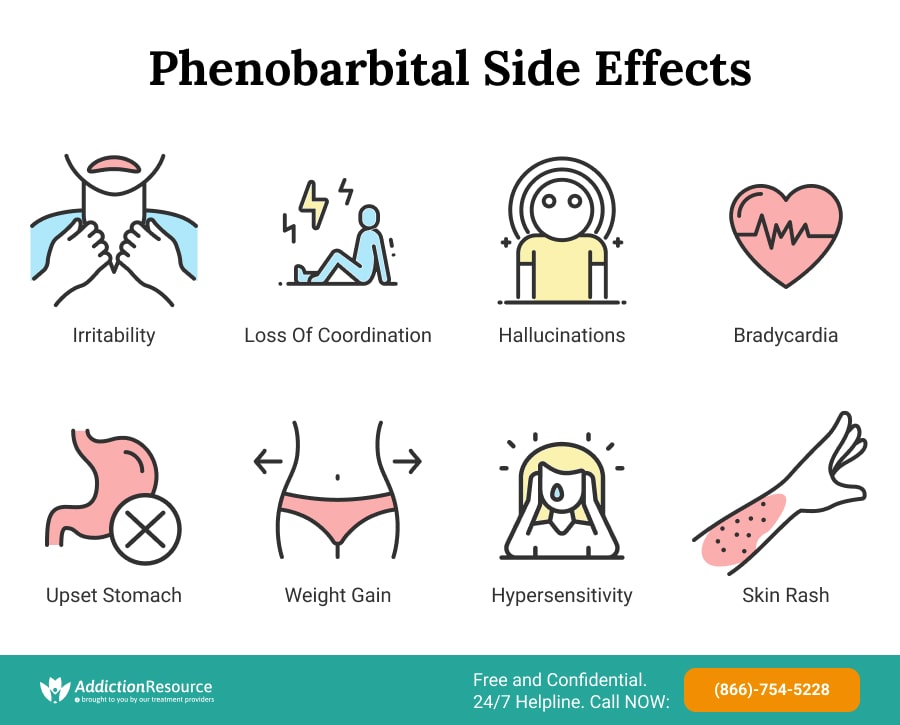Phenobarbital is a barbiturate belonging to the sedative-hypnotic drug class. It acts as a CNS depressant to help reduce brain activity and control overstimulation in case of a seizure. It is marketed under the brand name Luminal or Solfoton. It is widely used to treat seizures in infants and children as well as in adults, acute insomnia, and status epilepticus among other medical conditions. This is a prescription medicine and a category IV-controlled substance which means Phenobarbital long-term use has a potential risk of physical and psychological dependence.
Table Of Contents:
While it is useful for the treatment of various ailments, like all other drugs it has various adverse reactions. These adverse reactions vary from mild to severe depending on the individual’s health, previous medical conditions, dosage, duration, elimination rate, and metabolism. Depending on the manifestation, it is necessary to monitor Phenobarbital Side Effects in patients taking Luminal or Solfoton.
This article aims to provide information regarding the side effects of Phenobarbital, the dangers of its long-term use, and precautions one should be aware of during their treatment with luminal.
No approach is guaranteed to prevent adverse reactions from occurring but having proper information helps in their management.
Common Phenobarbital Side Effects
Phenobarbital is known to cause some adverse reactions in patients. Which side effects emerge can depend on which of the Phenobarbital uses the medication is being prescribed for. For example, when treating epilepsy, the most common undesired occurrence is dizziness, while for depression, it is insomnia. Common adverse reactions are similar to those of other medications in the barbiturate drug class. Somnolence is the most common adverse effect experienced by more than 10% of people using Luminol. Stated below are some other adverse reactions based on which body system they affect.
These Adverse Reactions Are Experienced by Less Than 1% Of the Population:
- Nervous system– Dizziness, Drowsiness, Memory struggles, Difficulty concentrating, Excitability, Irritability, Aggression, Confusion, Loss of coordination, Headaches, ataxia, anxiety, hallucination, nightmares, and abnormal thinking pattern
- Respiratory system– bradycardia and hypoxia
- Gastrointestinal system– upset stomach, loss of appetite, nausea, vomiting, and diarrhea or constipation.
- Other side effects– change in urine color, weight gain, lethargy, hungover effect, trouble with mouth or gums, hypersensitivity reaction, itch and rash on the skin, and inflammation at the injection site.
These Phenobarbital Side Effects are unpleasant, but the therapeutic effects of the medication are worth dealing with these side effects of Phenobarbital in the short term. In cases when Phenobarbital long-term complications or withdrawal symptoms occur, users should speak to their doctor about alternative medications.

Rare Phenobarbital Side Effects
Phenobarbital adverse effects that are less common may also emerge. Some of these rare side effects can have severe presentation if experienced by the individual, others are inconvenient for daily functioning but pose no long-term complication. These are not life-threatening, but their emergence can indicate that the individual is too sensitive to the medication and needs to switch to an alternative.
Less Common Phenobarbital Adverse Effects Which Can Have a Severe Presentation and Need Immediate Attention Are:
- Steven Johnson’s syndrome
- Megaloblastic anemia
- Liver damage
- Hallucinations
- Rickets
- Episodic apnoea
- Rapid fall in blood pressure
Some other Phenobarbital Side Effects are inconvenient for normal life functions but do not have any life-threatening effect on individual health and they usually go away when luminal is stopped. These include
- Chronic trouble sleeping
- Nightmares
- Sensations of spinning
- Hyperactive behavior
- Sleepwalking
The prescribing doctor may choose first to alter the Phenobarb levels taken to address these symptoms. Starting medication in a low dose and increasing it to the right dose helps the body in adjusting to the drug and also decreases the side effects and their onset. If side effects become severe or reduced dosage does not eliminate them, health professionals can also opt to discontinue medications. These adverse effects are extremely rare and do not manifest unless a patient has natural hypersensitivity to the drug.
Phenobarbital Long Term Side Effects
Phenobarb is a class IV controlled substance which means its long-term use can lead to physical and psychological dependence. This dependence is the result of only long term use and one can get withdrawal symptoms even with a constant dose of 120mg per day. Also, due to physical dependence and desensitization of receptors, with time higher dose is required to produce the same response which can lead to barbiturate toxicity if taken in higher than 1g dose.
Phenobarbital Long Term Side Effects Include:
- Impaired memory
- Confusion and agitation
- Suicidal thoughts
- Insomnia
- Aggressive behavior and social withdrawal
- Altered higher mental function
Chronic Phenobarb use can also eventually lead to impaired calcium levels in the body leading to osteoporosis, impaired renal and liver function, and folate deficiency leading to megaloblastic anemia. Those Phenobarbital long term side effects are seen in individuals taking Phenobarb for a long time usually for a period of weeks to months. They vary from person to person depending on medical condition, duration, and dosage of medications, and their body’s ability to eliminate the drug from the system. If someone is experiencing any of these symptoms or exhibiting signs of drug abuse or drug withdrawal, a doctor should be consulted immediately regarding the change in drug dose or prescription altogether.

Phenobarbital And Pregnancy & Breastfeeding
Luminol is classified as FDA category D. Phenobarbital in pregnancy poses some risk to a developing fetus. There is positive evidence to suggest an increased risk of fetal malformation in babies born to pregnant women taking Luminol. It can be prescribed by doctors if the benefits of drugs warrant the use in pregnant women despite the potential risk and damage to the fetus. One taking Phenobarb should know drug information and consult their doctor in case of pregnancy. Phenobarbital in pregnancy is directly related to low folate level. An appropriate level of folic acid is advised to be maintained in blood level by taking folic acid supplements to lower any congenital malformation. It is also recommended to monitor babies born to patients taking a solution at least for 14 days after they are born.
Phenobarb is secreted in breast milk in varying amounts depending on the co-administered drugs. It has an extremely long half-life and can be excreted in breast milk despite its extensive metabolism. Women taking barbiturates for seizures are advised to practice extreme caution and monitor any abnormal behavior change, sleep cycle disturbance, or change in weight of the baby. Monitoring of baby serum drug concentration is advisable but not necessary in many cases.
Even though Phenobarbital adverse reactions are not life-threatening, but their emergence can indicate that the individual is too sensitive to the drug and needs to switch to an alternative.
Alternatives To Phenobarbital As The Mean To Avoid Side Effects
Luminol is an anti-seizure medicine that does not come without side effects. There are some other drugs that medical practitioners can prescribe as alternatives to Phenobarbital as a means to avoid side effects. These drugs include Phenytoin, Carbamazepine, Pentobarbital, and Zonisamide. While these drugs have their side effects Carbamazepine is considered much safer than Phenobarbital for preventing seizures. Phenytoin has more adverse reactions and cannot be used in pregnant women. Here are comparisons between the most discussed alternatives for Phenobarbital that is Pentobarbital and Zonisamide.
Pentobarbital vs Phenobarbital
Pentobarbital is a recommended alternative to Phenobarbital. Pentobarbital vs Phenobarbital has been a heated debate for some time. It is often compared with Phenobarb as these two drugs belong to the same drug class. It is another anti-seizure barbiturate drug to treat status epilepticus and prevention of seizures. Various studies have concluded that it has more efficacy in the prevention of seizures than Luminol. In the side effects category of Pentobarbital vs Phenobarbital, there is not much difference. The reason why it is not a first-line treatment is that its safety in humans is still under discussion. Unlike Luminol, it has no antidote in case of drug toxicity. It can cause physical and psychological dependence like Phenobarbs but it has more severe withdrawal effects which can be life-threatening. Excessive caution is needed while prescribing it in place of Luminol.
Zonisamide vs Phenobarbital
Zonisamide is another drug prescribed to treat epilepsy and for the prevention of any future seizure. It is a sulphonamide anticonvulsant and carbonic anhydrase inhibitor which reduces neuronal firing by acting on T-type calcium channels in the brain in contrast to Luminol which is a barbiturate. Like Phenobarbs, it can cause drowsiness, headache, ataxia, and loss of coordination but it has some additional side effects. These include weight loss, doubled vision, sore throat, loss of concentration, and sleep disturbances. In Zonisamide vs Phenobarbital efficacy, It has less efficacy than Phenobarbital but it is recommended as an adjuvant therapy owing to its safety and less severe side effects.
Variables That Impact Phenobarbital Side Effect Emergence
Numerous factors can determine how or if Phenobarbital Side Effects emerge. Some of these factors include dose, formulation, any previous medical condition, drug interactions, and the condition for which one is taking it. To a degree, doctors can assess how likely it is that a given patient will experience adverse reactions and give them information about it, but it is not an exact science.
Variables That Can Impact Side Effect Emergence Include:
- Age – Phenobarbital Side Effects in infants and children are more severe than in adults. Children are especially prone to hyperactivity, agitation, aggression, and personality changes. If these symptoms become severe, another anticonvulsant can be prescribed.
- Health status – the presence of other diseases can make it easier for adverse reactions to emerge. The presence of declining liver or renal function can make it hard for the body to eliminate the drug from the system. Drug accumulation in the system can lead to drug toxicity and the emergence of side effects.
- Other substances – the use of medications, alcohol, and street drugs can all cause side effects to occur. It interacts with alcohol, birth control pills, steroids, and estrogen replacement pills.
- Gender – women tend to experience adverse reactions at a higher rate than men.
- Race – certain races may be more likely to experience adverse reactions than others due to their altered metabolic status.
- Genetic factors – some people, despite all other variables, are simply more likely to experience adverse reactions.
Still, someone could have none of the at-risk variables and still experience side effects. All patients taking the medication should be vigilant and monitor their health status keeping a close eye. In general, its level in blood should be regularly monitored. Any level rise can predict forthcoming side effects and possible complications. This medication is usually taken every day for the control of epileptic syndrome. If any of these symptoms emerge, another prescription can alleviate these symptoms.
Know Phenobarbital Side Effects For Their Timely Management
Many unpredictable variables at work can contribute to how and when side effects can occur. Luminol is prescribed when the benefits of using it outweigh the potential risks. However, for people who search for minimal side effects medicine, some ways can make it more likely that side effects of Phenobarbital will be reduced or eliminated. These include:
- Taking the medication with food
- Staying hydrated at all times
- Reading the information attentively and taking the prescription precisely as indicated
- Informing the prescribing doctor before taking new medications
- Never mixing Phenobarb with street drugs or alcohol
- Not taking medicine if the patient is hypersensitive to barbiturates
- Not taking the medication if liver function is impaired or the person has previous respiratory problems.
It is possible that even after considering all the correct steps, the patient will still experience short- or long-term side effects of Phenobarbital and need to eliminate the use of the medication. Should this be the case, they can work with their doctor to find a healthy alternative.
While anyone can experience side effects while on Phenobarbital, those who are at the most considerable risk are the individuals who abuse the medication. Anyone who is taking Phenobarb recreationally or higher doses than prescribed, is at risk of Phenobarb overdose and needs help to get clean. By contacting a drug and alcohol rehab center, those abusing the medication can get off it and live a better life.
Hope Without Commitment
Find the best treatment options. Call our free and confidential helpline
Most private insurances accepted
Page Sources
- Banu, S. H., Jahan, M., Koli, U. K., Ferdousi, S., Khan, N. Z., & Neville, B. (2007). Side effects of Phenobarbital and carbamazepine in childhood epilepsy: Randomised controlled trial. British Medical
- Bar-Oz, B., Nulman, I., Koren, G. et al (2000). Anticonvulsants and Breast Feeding. Pediatr-Drugs 2, 113–126, 334(7605). https://doi.org/10.1136/bmj.39022.436389.BE
- Camfield, C. S., Chaplin, S., Doyle, A. B., Shapiro, S. H., Cummings, C., & Camfield, P. R. (1979). Side effects of phenobarbital in toddlers; behavioral and cognitive aspects. The Journal of Pediatrics, 95(3). https://doi.org/10.1016/S0022-3476(79)80507-7
- Richter K. (1986) Alternative single anticonvulsant drug therapy for refractory epilepsy. https://doi.org/10.1002/ana.410190118
- Elafros, M. A., Bui, E., & Birbeck, G. L. (2014). Medication side effects among people with epilepsy taking phenobarbital in Zambia. Epilepsy Research, 108(9). https://doi.org/10.1016/j.eplepsyres.2014.08.005
- Livanainen, M., & Savolainen, H. (1983). Side effects of phenobarbital and phenytoin during long‐term treatment of epilepsy. Acta Neurologica Scandinavica, 68. https://doi.org/10.1111/j.1600-0404.1983.tb01535.x
- Zelleke, T. G., Schreiber, J. M., Vu, T. A., & Gaillard, W. D. (2020). Antiepileptic drugs. In Clinical Child Neurology. https://doi.org/10.1007/978-3-319-43153-6_27
- Zhang, L. L., Zeng, L. N., & Li, Y. P. (2011). Side effects of phenobarbital in epilepsy: A systematic review. In Epileptic Disorders (Vol. 13, Issue 4)
- Seki, T., Kumagai, N., & Maezawa, M. (2004). Effects of zonisamide monotherapy in children with epilepsy. Seizure, 13(SUPPL. 1), S26–S32. https://doi.org/10.1016/J.SEIZURE.2004.04.001
- Tomson, T., Battino, D., Bonizzoni, E., Craig, J., Lindhout, D., Sabers, A., Perucca, E., & Vajda, F. (2011). Dose-dependent risk of malformations with antiepileptic drugs: an analysis of data from the EURAP epilepsy and pregnancy registry. The Lancet Neurology, 10(7), 609–617. https://doi.org/10.1016/S1474-4422(11)70107-7

 Authored by
Authored by  Reviewed by
Reviewed by 
